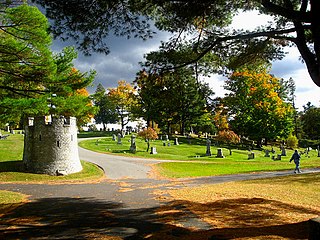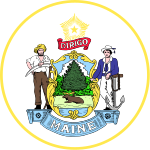
Hannibal Hamlin was an American attorney and politician who served as the 15th vice president of the United States from 1861 to 1865, during President Abraham Lincoln's first term. He was the first Republican vice president.

Presidential elections were held in the United States on November 7, 1848. Held in the aftermath of the Mexican–American War, General Zachary Taylor of the Whig Party defeated Senator Lewis Cass of the Democratic Party.

Presidential elections were held in the United States on November 2, 1852. Democratic nominee Franklin Pierce defeated Whig nominee General Winfield Scott.

Lot Myrick Morrill was an American politician who served as the 28th governor of Maine, as a United States senator, and as U.S. secretary of the treasury under President Ulysses S. Grant. An advocate for hard currency rather than paper money, Morrill was popularly received as treasury secretary by the American press and Wall Street. He was known for financial and political integrity, and was said to be focused on serving the public good rather than party interests. Morrill was President Grant's fourth and last Secretary of the Treasury.

The 1860 Republican National Convention was a presidential nominating convention that met May 16–18 in Chicago, Illinois. It was held to nominate the Republican Party's candidates for president and vice president in the 1860 election. The convention selected former representative Abraham Lincoln of Illinois for president and Senator Hannibal Hamlin of Maine for vice president.
In politics of the United States, party switching is any change in party affiliation of a partisan public figure, usually one who holds an elected office. Use of the term "party switch" can also connote a transfer of holding power in an elected governmental body from one party to another.

John Hubbard was the 22nd Governor of Maine in the United States.

The 1848 Whig National Convention was a presidential nominating convention held from June 7 to 9 in Philadelphia. It nominated the Whig Party's candidates for president and vice president in the 1848 election. The convention selected General Zachary Taylor of Louisiana for president and former Representative Millard Fillmore of New York for vice president.

John Winchester Dana was an American businessman, diplomat and Democratic politician in the U.S. state of Maine. He served as the 19th and 21st Governor of Maine and as Chargé d'affaires to Bolivia during the 19th century.

Joseph Hartwell Williams was an American politician who served as the 27th Governor of Maine from 1857 to 1858.
The following table indicates the party of elected officials in the U.S. state of Maine:

Mount Hope Cemetery in Bangor, Maine, is the second oldest garden cemetery in the United States. It was designed by architect Charles G. Bryant in 1834 and built by the Bangor Horticultural Society soon after, the same year that Bangor was incorporated as a city. The cemetery was modeled after Mount Auburn Cemetery (1831) in Boston, Massachusetts. Bangor was at that time a frontier boom-town, and much of its architecture and landscaping was modeled after that of Boston. The site has been listed on the National Register of Historic Places.

The 1849 United States Senate election in New York was held on February 6, 1849, by the New York State Legislature to elect a U.S. Senator to represent the State of New York in the United States Senate.
Elijah Hamlin was an American lawyer, businessman, politician and historian. He served in both houses of the Maine state legislature and as mayor of Bangor.

The Hannibal Hamlin House is a historic house at 15 5th Street in Bangor, Maine. Built c. 1848–51, this well-preserved Italianate house was the home of U.S. Vice President Hannibal Hamlin from 1862 until his death in 1891. From 1933 until 2007 it served as the official residence of the president of Bangor Theological Seminary. It was listed on the National Register of Historic Places in 1979.

The 1860 United States presidential election in Illinois took place on November 6, 1860, as part of the 1860 United States presidential election. Illinois voters chose 11 representatives, or electors, to the Electoral College, who voted for president and vice president.

The 1850–51 Massachusetts gubernatorial election consisted of an initial popular held on November 11, 1850 that was followed by a legislative vote that was conducted on January 11, 1851. It saw the election of Democratic Party nominee George S. Boutwell. The ultimate task of electing the governor had been placed before the Massachusetts General Court because no candidate received the majority of the vote required for a candidate to be elected through the popular election.

The 1840 Massachusetts gubernatorial election was held on November 9.

A gubernatorial election was held in Maine on September 14, 1840. The former mayor of Bangor Edward Kent, the Whig nominee, defeated the incumbent governor John Fairfield, the Democratic nominee.
This page is based on this
Wikipedia article Text is available under the
CC BY-SA 4.0 license; additional terms may apply.
Images, videos and audio are available under their respective licenses.




















